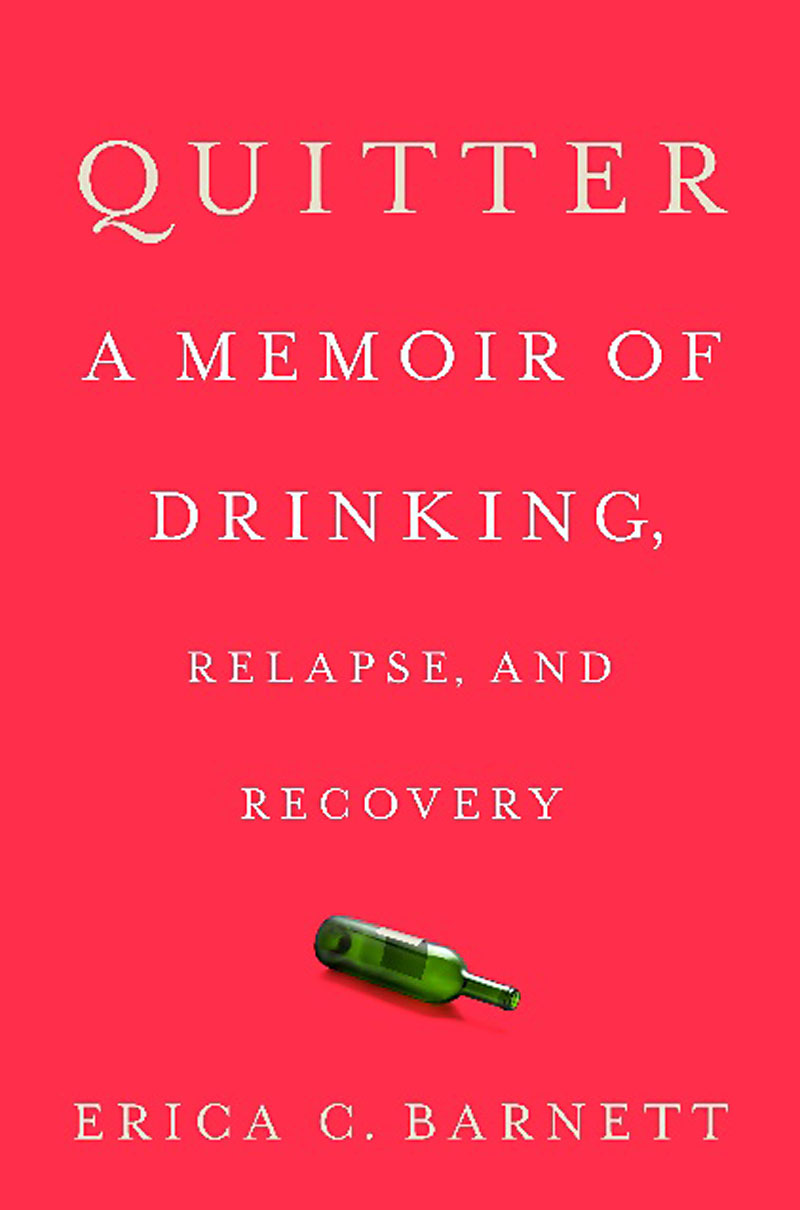Quitter: A Memoir of Drinking, Relapse, and Recovery – an Excerpt
In this chapter from her book, Erica C. Barnett describes the point when her life became a shrinking circle
By Erica C. Barnett, Fri., July 10, 2020
"I didn't start out good at drinking; like a lot of skills I picked up in my life, I practiced until I got the hang of it."
That admission comes early in Erica C. Barnett's Quitter: A Memoir of Drinking, Relapse, and Recovery, just after the author has described hitting "rock bottom. The fourth or fifth one." That day involved downing two bottles of wine on the way to clean out her desk at the magazine she'd just been fired from, pissing off a friend who had driven Barnett to detox the week before, downing still more wine on the way home, running through a driving Seattle rain, doing a face-plant on the concrete sidewalk, and eventually blacking out.
That Barnett is willing to open her book this way – candid about her failings, unsparing in the details – speaks volumes about her honesty regarding addiction to alcohol. It can overtake a person's life, debase a person, drag a person into depths of disgraceful behavior; I'm living proof, she tells us.
Quitter takes us from Barnett's first drink in Sugar Land at age 13 through her last drink in Seattle 24 years later. Along the way, Barnett takes many more drinks, along with reporting gigs at the Texas Observer, Seattle Weekly, The Stranger, and, yes, The Austin Chronicle. She wrote for the News section from 1998-2001, and in Quitter, the paper appears as the reason she left Austin for the Great Northwest.
Barnett remains there to this day and is currently writing about addiction, housing, poverty, and drug policy at her blog, The C Is for Crank, as well as writing for local and national publications such as Grist, The Huffington Post, and Seattle Magazine.
– Robert Faires
Chapter 24: A Shrinking Circle
The reality of daily life during my last several years of drinking wasn't messy – it was banal, the way a terminal disease that drags on for years can start to feel routine. I drank, I went to work (or didn't), I threw up a lot, and struggled to remember to eat, and drank some more until it was time to go to bed and wake up early the next morning to do it all over again. It was like I was drawing a circle around my life that, every day, drew a little bit smaller, until one day, there wasn't much left outside the line that ran from my front door to the bus stop, the liquor store, the grocery store, and back. On many weekends, when I had enough alcohol in the house to last until Sunday, and the only distinction that marked the hours was waking and sleeping, that circle shrunk further, until it was barely larger than my bed and the 100 sq. ft. of popcorn ceiling above it.
Weekdays required a bit more effort – more makeup, less napping, a deeper level of subterfuge – but the central obsession was the same. Where can I get liquor on the way to work? How can I make sure no one catches me drinking at the office? What excuse can I make to head out for more wine mid-afternoon? How can I get rid of Josh at the end of the day so I can grab a bottle before I get on the bus? How much do I need to force myself to eat so that I won't be as violently sick tomorrow as I was today? What stays down better – a sandwich or a salad?
If you ever hear someone accuse addicts of being lazy, please correct them: Addicts are some of the most industrious people in the world. Ginger Rogers did everything Fred Astaire did, except backward and in heels – well, we do everything normal people do, except distracted and impaired. (Oh, and worse. We do everything worse, too.) Susan Cheever, the daughter of the alcoholic author John Cheever, wrote that alcoholics' behavior is often characterized by "a pattern of self-destruction combined with compensatory brilliance," and while I was far from brilliant in those last, unsettled years of heavy drinking, I got by well enough to convince my friends not to stage an intervention and my bosses not to fire me. (Well, until they did.) I still churned out copy, still went through the motions of doing interviews, still turned in magazine columns and features more or less on time. And if the person I was interviewing expressed concern for my health, or my story was riddled with typos and five days late, I could handle the criticism – all I had to do was apologize, say I was feeling under the weather, and drink until it wasn't my fault anymore.
When I look back at the two or three years I spent doing virtually nothing outside of work – seeing my boyfriend only when I felt well enough to leave my apartment, no writing, no hobbies or vacations or projects – I think, How did I waste so much time? And then I remember: I was always busy – busy maintaining my supply, busy coming up with lies to buy time and get myself off the hook, busy doing the emotional and mental heavy lifting it takes to be a full-time alcoholic in full-blown denial.
By the fall of 2014, though, I started to sense that a change was coming. I was sick all the time, every moment I was awake, and no one seemed particularly sympathetic. Josh was sick of pulling me out of the office to ask me if I'd been drinking. He was sick of getting calls late at night. And he was sick of telling his girlfriend he would be right back, that something had come up with Erica and he had to deal with it. At some point, I had appointed my best friend, Josh, as my lifeline, and I expected him to drop everything he was doing to pay attention to me, or come rescue me from whatever predicament I had gotten myself into. "My parents don't love me and they're driving me crazy and I want to shove chopsticks in my eyes!" I sobbed from my childhood bed in Mississippi. "A mugger ... just stole ... my computer!" I wailed, as he tiptoed out of a press conference and whispered, "Have you called the police?" For their whole relationship, his girlfriend, Heather, had known me only as a black hole of need, the person who was always in a crisis and needed constant attention. You know that friend who always turns every misunderstanding into a telenovela-level drama, to the point that you start screening her calls? Light that chick's hair on fire, throw in a fifth of vodka and a decade's worth of resentments, and that was me.
From Quitter by Erica C. Barnett, published by Viking, an imprint of Penguin Publishing Group, a division of Penguin Random House, LLC. Copyright 2020 by Erica C. Barnett.














